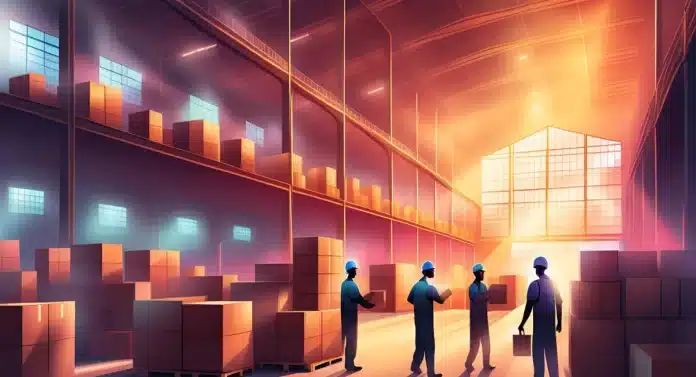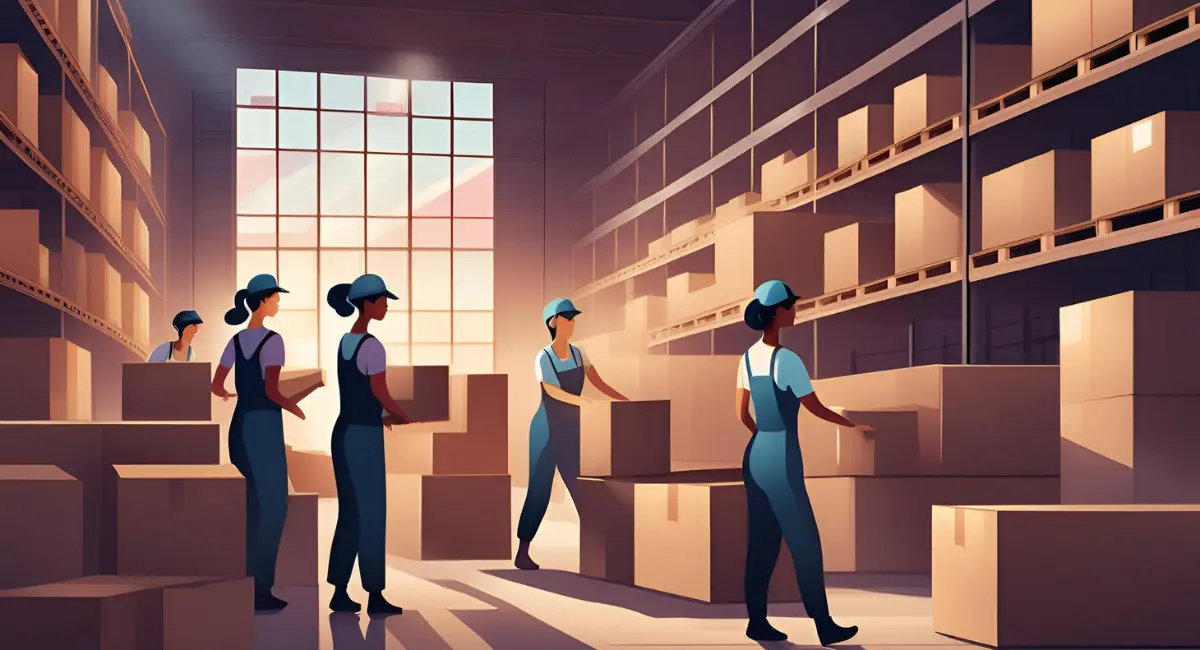In today’s fast-paced world, staying competitive is crucial. Embracing virtual reality (VR) offers warehouse operators in Singapore a promising solution.
The Singapore logistics sector stands to gain significantly from VR technology. By integrating VR into warehouse settings, companies can create virtual simulations of real environments.
This implementation requires careful planning but offers substantial benefits. VR enables managers to optimize space utilization, improve planning, and accelerate employees’ proficiency effectively.
In the upcoming sections, we will explore the future of warehouse training with VR, its key benefits, and the applications of both virtual reality and augmented reality (AR) in Singapore’s logistics landscape.
We will also delve into how VR enhances productivity and safety in warehouse operations, as well as the cost savings and efficiency gains associated with immersive learning.
Table of Content:
Table of Content
The Future of Warehouse Training with VR
VR technology is revolutionizing warehouse training, offering solutions to address industry challenges. It reduces turnover, enhances safety, and bridges skill gaps.
By leveraging VR, warehouses create immersive training experiences where employees practice tasks in a virtual environment, improving proficiency and confidence.
Traditional methods often fail to prepare employees for warehouse complexities. VR fills this gap with realistic simulations, complete with typical challenges.
New or existing employees can undergo comprehensive training efficiently without direct supervision, adapting to changes and new technologies seamlessly.
This innovative training approach transforms onboarding and improves overall effectiveness. Employees learn actively through virtual scenarios, gaining practical experience for enhanced performance.
As the industry evolves, embracing VR becomes crucial for competitiveness and meeting logistics demands. Investing in VR training attracts talent, drives innovation, and ensures operational excellence in Singapore’s warehouses.
Implementing VR in Warehouse Operations
Integrating VR into smart warehouse operations is a multi-step process with significant efficiency benefits. Whether through custom VR solutions or off-the-shelf applications, VR enhances training and operations.
The key to implementation is creating virtual simulations that allow employees to practice tasks, navigate layouts, and familiarize themselves with equipment in immersive environments. This optimizes training effectiveness and performance.
Careful planning is essential, considering warehouse-specific needs and goals. Custom solutions address unique challenges, while off-the-shelf applications offer quick deployment for common needs.
VR technology offers substantial benefits for logistics companies. It improves training efficiency, reduces errors, and enhances productivity. Tailored VR solutions or off-the-shelf applications streamline workforce proficiency.
Key Benefits of Using VR in Warehousing
Utilizing VR in warehouse management brings significant advantages to Singapore’s logistics sector. VR enables managers to visualize and optimize space utilization, thereby enhancing planning and operational efficiency. Additionally, immersive VR training reduces the time required for proficiency and enhances employee competency.
VR revolutionizes warehouse management by providing insights and solutions to key challenges. It optimizes space usage, leading to improved resource allocation and cost savings. Moreover, VR training offers a realistic alternative, enhancing employee understanding and retention.
The integration of VR simulations provides valuable insights into the supply chain, allowing for the identification of bottlenecks and inefficiencies. This facilitates data-driven decision-making, optimizing processes for improved efficiency and faster delivery times.
In conclusion, embracing VR technology in warehouse management drives positive change, improving planning, training, and supply chain efficiency. It empowers companies to stay competitive and deliver exceptional results in the dynamic logistics sector.
VR and AR Applications in Warehousing
In warehousing and supply chain management, virtual reality (VR) and augmented reality (AR) are revolutionizing operations, optimizing processes, and enhancing efficiency. In Singapore’s logistics landscape, these immersive technologies are already making a significant impact, helping warehouses meet industry demands.
VR technology is particularly useful in inventory management, offering real-time tracking and management through virtual simulations. This improves accuracy and streamlines workflows. AR is transforming order picking by providing workers with real-time information displayed in their field of vision, reducing errors and enhancing efficiency.
Additionally, AR overlays digital information onto the physical warehouse environment, aiding navigation and task completion. This real-time feedback ensures adherence to procedures and safety protocols.
By leveraging VR and AR, warehouses in Singapore can enhance inventory management, improve order-picking efficiency, and boost overall productivity, staying competitive in the dynamic logistics sector.
Training Enhancements Through VR
VR technology revolutionizes warehouse training, enhancing productivity, safety, and proficiency. Through immersive experiences, VR simulations enable employees to practice tasks repeatedly, improving accuracy and efficiency.
VR training offers realistic simulations, allowing employees to develop essential skills and improve performance. Its interactive nature enhances engagement and knowledge retention, creating a more effective learning experience.
One of VR training’s key benefits is improved safety in warehouses. Simulations familiarize employees with safety protocols in a controlled virtual environment, reducing hazards and accidents.
Moreover, VR significantly reduces the time needed for proficiency compared to traditional methods. Employees can practice tasks repeatedly, accelerating learning and skill development.
Customer use cases in Singapore’s logistics sector demonstrate VR training’s effectiveness. Improved productivity and reduced errors are reported, indicating successful employee training.
Implementing VR training in warehouses enhances overall efficiency and productivity. Its immersive nature allows for comprehensive task understanding and optimizes workflows and processes.
By leveraging VR for training, Singaporean warehouses ensure employees are skilled and safe. This leads to a competent workforce, fewer errors, and enhanced efficiency.
Cost Savings and Efficiency Gains
Implementing VR technology for immersive learning and training in logistics and manufacturing sectors can yield significant cost savings and productivity boosts. By leveraging VR, companies can revolutionize training programs, leading to more efficient skill acquisition and reduced reliance on costly in-person sessions.
With VR training, employees learn at their own pace and can repeat simulations as needed, enhancing proficiency without costly disruptions. This flexible approach minimizes operational interruptions and maximizes productivity.
Additionally, VR training provides a safe environment for skill practice, reducing accident risks and material waste. This saves costs associated with workplace incidents and ensures smoother workflows.
Preparing for the Future with VR
As VR technology continues to evolve, it paves the way for exciting future developments in the logistics workforce. By embracing VR and staying updated with the latest advancements, logistics companies in Singapore can position themselves competitively and adapt to evolving industry trends.
With the integration of spatial computing and immersive learning, VR has the potential to revolutionize logistics operations. The logistics workforce can leverage VR technology to enhance their skill sets and optimize operational efficiency.
By preparing for the future with VR, warehouses can stay ahead of the curve. Singapore, known for its innovative logistics sector, can harness the power of VR to improve training effectiveness, streamline processes, and deliver exceptional results. Investing in VR training programs ensures that employees are equipped with the necessary skills to navigate the industry’s evolving demands.





















































